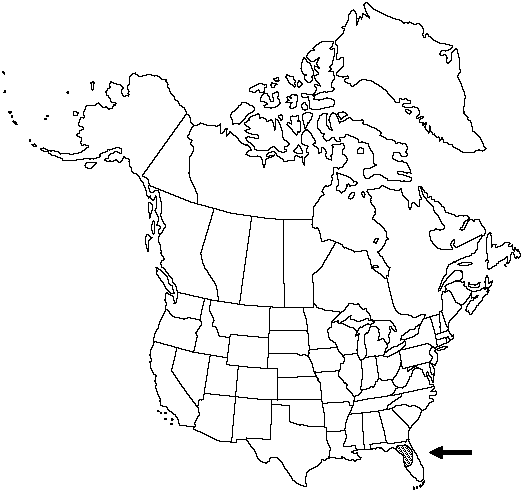Difference between revisions of "Asplenium cristatum"
in Lamarck et al.,Encycl. 2: 310. 1786.
FNA>Volume Importer |
FNA>Volume Importer |
||
| Line 46: | Line 46: | ||
|publication year=1786 | |publication year=1786 | ||
|special status= | |special status= | ||
| − | |source xml=https://jpend@bitbucket.org/aafc-mbb/fna-data-curation.git/src/ | + | |source xml=https://jpend@bitbucket.org/aafc-mbb/fna-data-curation.git/src/f6b125a955440c0872999024f038d74684f65921/coarse_grained_fna_xml/V2/V2_96.xml |
|genus=Asplenium | |genus=Asplenium | ||
|species=Asplenium cristatum | |species=Asplenium cristatum | ||
Revision as of 18:58, 24 September 2019
Roots proliferous. Stems erect, not branched; scales blackish throughout or rarely with narrow pale margins, narrowly linear, mostly only 8–12 cells wide proximally, 2–3 × 0.5–0.8 mm. Leaves monomorphic. Petiole blackish to greenish, dull, 1–7(–17) cm, 1/5–1/2 length of blade; glabrous with few scales at base. Blade oblong-lanceolate, 2–3-pinnate, (2–)6–12(–18) × 2.7–10 cm, thin, glabrous; basal pinna pairs unreduced to reduced 1/4; apex gradually reduced, not rooting. Rachis blackish, dull, glabrous. Pinnae in (7–)10–15(–20) pairs, oblong, 2-pinnate throughout; medial pinnae (1–)2–3(–6) cm, all ± curved upward; proximal pinnae descending; base cuneate; apex attenuate. Pinnules ± asymmetric, 1–5(–10) × 1–4 mm; margins strongly dentate, cut 1/3–1/2 to axis. Veins free, evident. Sori 1–4(–6) per pinnule, usually on both basiscopic and acroscopic sides. Spores 64 per sporangium. 2n = 72.
Habitat: Low limestone boulders and ledges in deep moist woods
Elevation: 0–20 m
Distribution

Fla., Central America, South America.
Discussion
A widespread tropical American species, Asplenium cristatum is local in west central Florida.
Selected References
None.